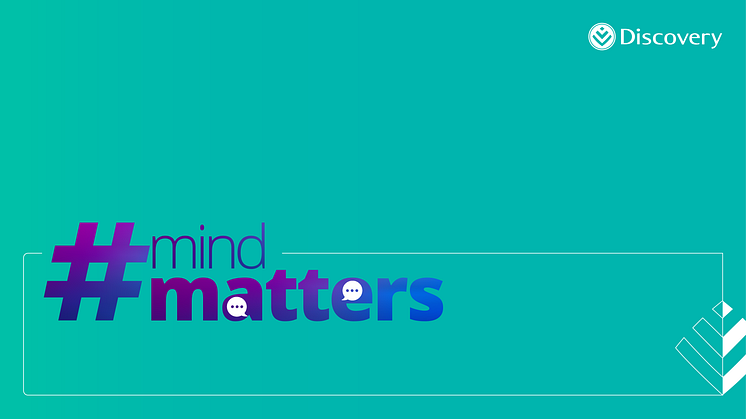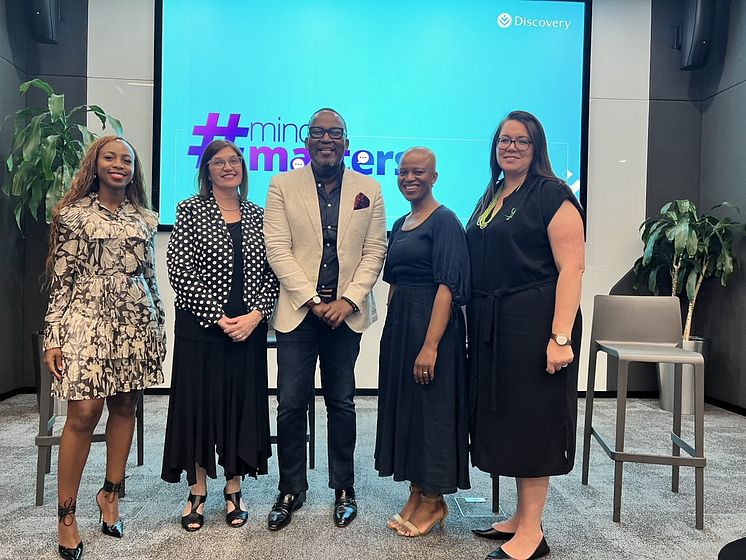
Press release -
Tackling the rising tide of depression through screening, prevention and digital therapeutics for mental health
- Across the world and in South Africa, depression is the most common form of mental illness.
- 1 in 3 people in South Africa experience a mental health issue.
- Only 1 in 10 people with a mental health issue have access to treatment.
- What role do healthy eating, exercise, holistic healthcare, and digital therapeutics for mental health play in tackling the unprecedented rise in mental illness – particularly depression – evident on a local and global basis?
Johannesburg, 11 October 2023 – In recognition of World Mental Health Day on 10 October 2023, Discovery convened a panel discussion with four expert panellists reflecting on the burgeoning prevalence of mental illnesses locally and globally. Bongani Bingwa, journalist and host of the Breakfast Show on Radio 702, facilitated the discussion which focused on depression – the primary driver of mental illness across the world. Panellists explained the signs and symptoms of depression, key elements of prevention and treatment (with a look at recently launched digital therapeutics for mental health) – and explored studies around the lifestyle habits that protect us from poor mental health.
1 in 3 people in South Africa experience a mental health issue, but only 1 in 10 people access care
Cassey Chambers, Operations Director at the South African Depression and Anxiety Group (SADAG) explained: “Depression is the primary driver of mental illness, and young adults, adolescents and children are particularly vulnerable. It is most often diagnosed in women because they are more likely to screen and reach out for help. Undiagnosed and untreated, depression is the leading cause of suicide in South Africa and globally. In fact, in South Africa men are four times more likely to die because of suicide than women.”
Chambers shared that 1 in 3 people in South Africa experiences a mental health issue, yet only 1 in 10 people who require mental health support access any form of treatment. It’s estimated that poor mental health costs South Africa in the region of R 161 billion a year.”
Chambers explained that: “Prior to the COVID-19 pandemic, we received around 600 calls per day to our free national helpline. Three years post the pandemic we receive 3000 calls per day and hundreds of people also reach out to us via SMS, email or social media, and this increase is a proxy for the state of people’s mental health in South Africa. Contributors to depression include everything from day-to-day stressors to trauma, loss, abuse, gender-based violence, the effects of crime, divorce and separation, financial stressors and more.”
Depression affects 60% of DHMS members diagnosed with a mental health condition
Dr Maritha van der Walt, Chief Medical Officer at Discovery Life added that for 2020 alone – the first year of the COVID-19 pandemic – Discovery Life experienced a 25% spike in mental health related claims. She said: “While the pandemic is behind us, people continue to feel the effects of the loss of loved ones, jobs, income and for a while to come there will continue to be mental health claims.”
Discovery Life data also show that in 2022 the business experienced suicide claims that were 13% higher than they were for the 2019 to 2021 period and 24% higher than for the 2016 to 2018 period. Comparing 2019 and 2021 to 2022, Discovery Life data also show a 149% increase in suicides in people under 30 years of age. Women are 1.8 times more likely than men to claim through the Income Continuation Benefit for mental health related reasons. However, life cover claims related to suicide are 2.2 times more likely to be for men than women.
Dr Noluthando Nematswerani, Chief Clinical Officer at Discovery Health also shared that among Discovery Health Medical Scheme (DHMS) members, mental health conditions have increased in prevalence from 11.3% in 2018 to 13.5% in 2022. Depression is the condition affecting the majority, with 60% of members diagnosed with a mental health condition (mostly young adult female members). The prevalence of depression has increased from 6.3% in 2018 to 8.1% in 2022 and has also steadily increased over the years preceding this period. Depression also accounts for 57% of direct Scheme spend on mental health services.
Digital therapeutics – a game-changer in extending support to people with depression?
Structured screening and holistic support has been available to Discovery Health Medical Scheme (DHMS) members since 2020, through the Scheme’s Mental Care Programme. Dr Nematswerani added, “At the end of September, we made South Africa’s first funded digital therapeutic – or ‘DTx’ as they are called – available to DHMS members aged 18 years or older, who have a diagnosis or symptoms of depression. This tool represents Discovery Health’s partnership with SilverCloud® by Amwell® – a globally leading digital behavioural health and wellbeing platform.”
Prescribed by a GP, psychologist, or psychiatrist the new digital mental health benefit gives members access to internet-based Cognitive Behavioural Therapy (iCBT), funded from the Scheme’s risk pool. Evidence shows that, to treat depression and anxiety, iCBT is as effective as CBT delivered face-to-face. The benefits of providing DHMS members access to this tool include allowing patients to access care 24-7, no matter where they are located. Care and treatment can also be personalised to increase treatment effectiveness and outcomes.
As members engage, real-time data is shared with the prescribing healthcare provider who can view and track progress in a positive feedback loop.
People who have cardiovascular-related diseases at high risk of mental illness too
“What makes quantifying the impact of mental illness even harder is that people may not present with the typical symptoms of mental illness. They may present with other physical manifestations such as chronic pain and may be a significant comorbid condition in people living with diseases like diabetes or hypertension,” says Dr Nematswerani. “We have almost one million DHMS members who are living with chronic conditions, and many of them may have coexisting and undiagnosed depression.”
Dr Mosima Mabunda, Head of Wellness at Discovery Vitality added that, “When someone presents with anything from symptoms such as insomnia, to high blood pressure or cardiovascular conditions, it’s key to also screen them for mental health conditions such as depression.”
Dr Nematswerani agreed, adding: “General Practitioners are our channel into the healthcare system. Studies show that people who have diabetes are two to three times more likely (than people who do not have diabetes), to have a mental health condition. While those who are closely managed by their primary healthcare provider, show lower rates of mental illness.”
At the same time, screening to identify the early signs of mental illness is key and making screening easily accessible is crucial. Dr Mabunda explains: “Through the Vitality programme we offer and incentivise biannual mental health screening. Not only do these channels remove the stigma around mental health screening, but they also help people to recognise the symptoms of depression. Our data show that members who have moderate to severe depression scores are highly likely to end up under professional care, showing that Vitality’s assessments and incentives work in leading people to treatment.”
Exercise and nutrition maintain mental health and alleviate symptoms of depression
Dr Mabunda explained that even moderate levels of exercise have been associated with lowering the risk of depression. Vitality data was included in a study published in the British Journal of Sports Medicine called ‘Physical Activity and the Prevention of Depression: A Longitudinal Analysis of a South African Database’, which showed a strong relationship between engaging in physical activity – even 30 minutes of walking once a week, or going from 5000 steps to 10000 steps per week – and the reduced incidence of depression in females.
“Our data analytics also show that our fitter members have fewer symptoms of depression,” added Dr Mabunda. “Symptoms of moderate to severe depression are 4.9-fold proportionally lower among those Vitality members who have high cardiorespiratory fitness. We are doing all we can to incentivise fitness among all members. From 2024, we will reward members with up to 10 000 points per year, based solely on their VO2 max readings (simply a measure of how much oxygen the body can use during exercise) taken from their wearable devices. Members will also be able to book a class at any one of over 400 fitness facilities nationwide in the Vitality fitness network and enjoy up to 24 free visits a year doing whatever form of exercise they enjoy.”
“It is not uncommon that in times of stress, people turn to comfort food – often highly-processed, high-sugar, high-fat foods, which can worsen the effects of mental illness and bring on added complications such as weight gain upping our risk of cardiometabolic conditions. Here, our Vitality HealthyFood benefit is designed to make healthy eating more attractive and affordable and help people to focus on healthy eating as a habit, so that in times of stress they are less likely to revert to unhealthy choices.”
Depression is a disease, and it can be treated
“Prevention is always better than cure,” said Dr van der Walt. “And when it comes to mental illness, for prevention to be possible we need people to be aware of everything from the risk factors for depression to the signs and symptoms people might experience and the help that they can access. People also need to see depression as a disease and realise that something can be done about it, ideally through a holistic approach that treats depression as a whole-body condition.”
ENDS
Notes to editors:
- A recording of the discussion is available on request.
- Please see the three separate factsheets for additional information on mental health statistics and benefits from by Discovery Health, Discovery Life and Discovery Vitality.
- Attached media release: Amwell® partners with Discovery Health to bring first-of-its-kind digital mental health benefit to South Africa
Image caption (from left to right):
- Dr Mosima Mabunda, Head of Wellness at Discovery Vitality
- Dr Maritha van der Walt, Chief Medical Officer at Discovery Life
- Bongani Bingwa, journalist and host of the Breakfast show on Radio 702
- Dr Noluthando Nematswerani, Chief Clinical Officer at Discovery Health
- Cassey Chambers, Operations Director at the South African Depression and Anxiety Group (SADAG)
Topics
Categories
Discovery information
About Discovery
Discovery Limited is a South African-founded financial services organisation that operates in the healthcare, life assurance, short-term insurance, banking, savings and investment and wellness markets. Since inception in 1992, Discovery has been guided by a clear core purpose – to make people healthier and to enhance and protect their lives. This has manifested in its globally recognised Vitality Shared-Value insurance model, active in over 40 markets impacting over 40 million lives. The model is exported and scaled through the Global Vitality Network, an alliance of some of the largest insurers across key markets including AIA (Asia), Ping An (China), Generali (Europe), Sumitomo (Japan), John Hancock (US), Manulife (Canada) and Vitality Life & Health (UK, wholly owned). Discovery trades on the Johannesburg Securities Exchange as DSY.






